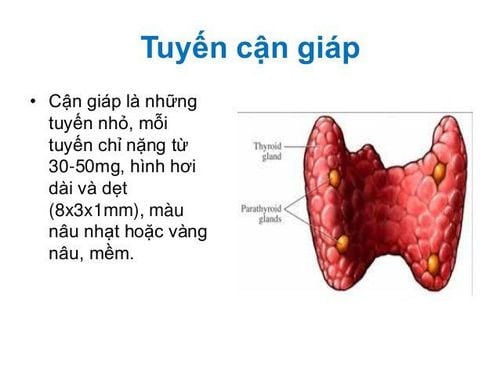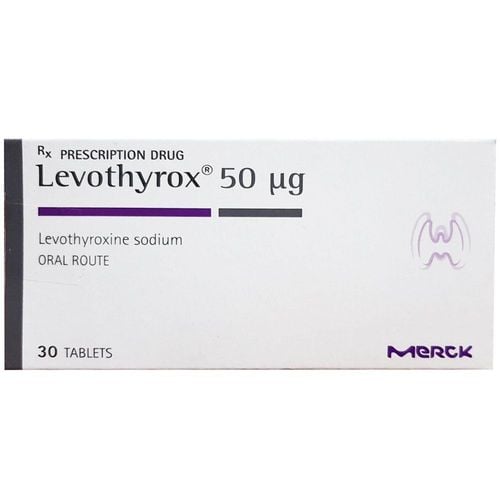This is an automatically translated article.
The article is professionally consulted by Master, Doctor Nguyen Thi Ngoc - General Internal Medicine - Endocrinology, Department of Examination & Internal Medicine - Vinmec Central Park International General Hospital.Normal blood calcium levels are important for the functioning of blood vessels, muscles, and the neurotransmitter system. If you have symptoms of hypocalcemia, your doctor will need to test your blood for parathyroid hormone PTH to confirm disease in this organ.
1. What is the role of parathyroid hormone?
Parathyroid hormone PTH is made by four small parathyroid glands in the neck region, behind the thyroid gland. This organ is responsible for controlling calcium levels in the blood.When calcium levels are too low, the parathyroid glands release parathyroid hormone PTH to bring calcium levels back to normal. Conversely, when calcium levels rise, the parathyroid glands stop producing and releasing parathyroid hormone PTH.
2. When to test for parathyroid hormone PTH?
A blood test for parathyroid hormone PTH can help your doctor find out if abnormal calcium levels in the body are caused by the parathyroid glands. Thus, the doctor may order a test for parathyroid hormone PTH in the blood if the patient has symptoms of hypercalcemia or hypocalcemia.Symptoms of hypercalcemia include:
Abdominal pain Thirst Need to urinate often Decreased bowel movements: nausea, vomiting, constipation Fatigue, lethargy, may worsen depression, paranoia, hallucinations , coma Myalgia, muscle weakness, decreased tendon reflexes, decreased neuromuscular coordination Bone pain Kidney stones Symptoms of hypocalcemia include:
Muscle spasms Itching or numbness in the hands, feet or around the mouth Difficulty swallowing People who have a diet or eat foods that are poor in calcium Weakness or broken nails Syncope or lethargy More severe may have the following symptoms:
Tooth wear Irregular heartbeat or low blood pressure Depression and lethargy, anxiety, irritability, mental disorders Decreased blood clotting Fractures, thinning bones or osteoporosis Growth and development delays in children

Hormone tuyến cận giáp PTH được tạo ra bởi bốn tuyến cận giáp nhỏ ở vùng cổ, phía sau tuyến giáp
3. How is the parathyroid hormone PTH test performed?
The blood test for parathyroid hormone PTH is done in the same way as other blood tests. The patient does not need to fast or make any special preparations. When you get to the lab, a nurse or technician will draw blood from a vein in your arm and put it in a test tube.The entire parathyroid hormone testing process is automated, from the time the aspirator collects the specimen, analyzes it on the blood and gives the results, to the time it is destroyed. Patients can resume normal activities immediately after blood collection. Results will be returned within one to several hours and will be analyzed by the attending physician.
4. Analysis of test results of parathyroid hormone PTH
High levels of parathyroid hormone PTH can be caused by an overactive parathyroid gland. This is known as hyperparathyroidism. However, there are other potential causes of elevated parathyroid hormone PTH levels, such as:
Parathyroid tumors Chronic kidney disease Low vitamin D levels Low calcium levels Pregnant or breastfeeding women breast-feeding (uncommon) In contrast, low levels of parathyroid hormone PTH may be related to causes of underactive parathyroid glands, leading to hypoparathyroidism:
Thyroid surgery Surgery, Radiation therapy or neck interventions in general Cancer metastases from elsewhere Too much calcium in the long term (from milk or many antacids) Low magnesium levels Vitamin D toxicity Primary calcium levels Disease autoimmune, tissue inflammation (sarcoidosis)

Nồng độ hormone tuyến cận giáp PTH cao có thể do tuyến cận giáp hoạt động quá mức
In summary, although rare, parathyroid gland diseases affect quite a lot of living activities in the body. Accordingly, the quantification of parathyroid hormone PTH in the blood is an essential test to identify the pathology on this organ, thereby making a diagnosis and appropriate treatment for each situation.
To register for examination and treatment at Vinmec International General Hospital, you can contact Vinmec Health System nationwide, or register online HERE.
MORE:
Common warning signs of congenital thyroid disease common in newborns? I have goiter, can I get pregnant?













